 Blogs
Blogs
January 31, 2025 • 9 min read
GOALies in Northwest Syria Share Their Experience of Returning Home After the Fall of Assad.
In Syria, shortly after the fall of the Assad regime in December 2024, thousands of Syrians, including many GOALies in Northwest Syria, began returning to the cities and villages from which they had been displaced during the country’s 14-year conflict. While most returning Syrians share great excitement about going home after enduring the challenges of displacement, they are also reluctant to witness the devastation and conscious of the immense job of rebuilding ahead. These are their stories.
Indescribable Joy: Mahmoud’s Story
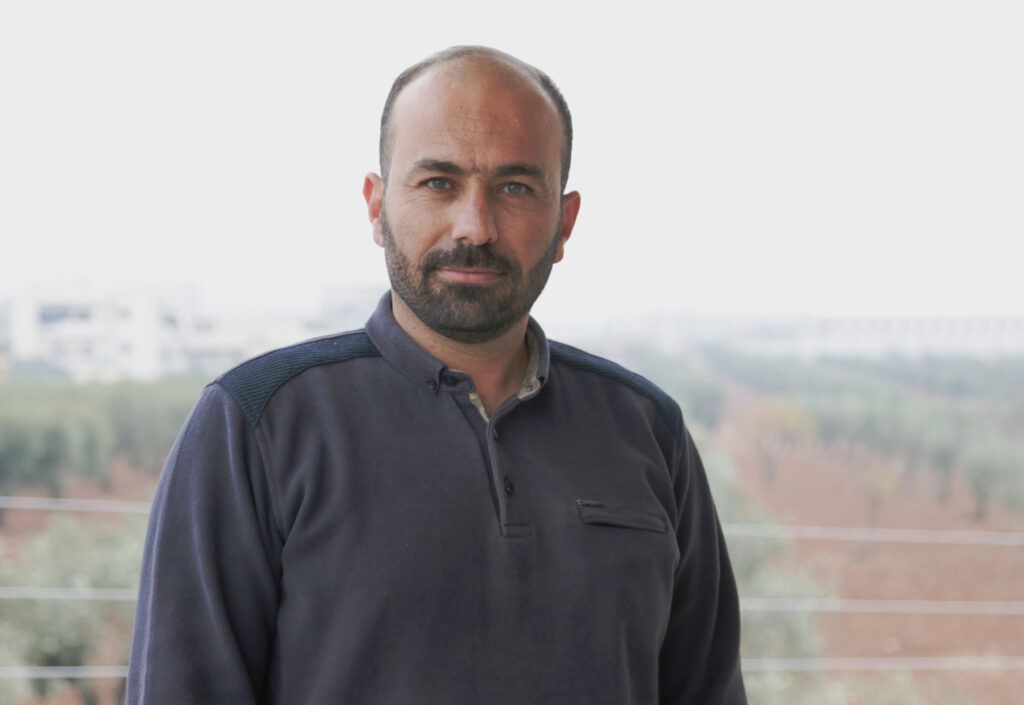
Mahmoud, GOAL Syria Systems Coordinator.
Every day for the past 13 years, Mahmoud, a GOAL Systems Coordinator based in Northwest Syria, longed for the scent of the jasmine tree that adorned the entryway to his home in southwest Aleppo. He had always reflected fondly on Aleppo, where he grew up and enjoyed much of his youthful days. However, not long after graduating from university in 2011, Mahmoud was displaced because of the conflict.
Now a father of five, the 36-year-old veteran humanitarian was overjoyed with the prospect of returning home after the fall of the Assad regime. However, he was worried that his flower-scented neighbourhood might have been destroyed in the conflict and that his children, raised in displacement, may never visit their father’s ancestral house.
“Soon after the fall of the regime, I took the short journey to Aleppo across defunct conflict lines. Approaching my neighbourhood, just as I began recalling the memories of my youth, I was surprised to see that everything was the same as I left, and my house had not changed at all. My joy could not be described as I recalled how I spent my university days here, seeing every little corner where I used to sit with friends or study for my exams still standing.”
While he was happy to see that his house had been saved from the destruction of war, Mahmoud wondered if his neighbours had been as lucky.
“I have not come across anyone – none of my previous neighbours were around, and I do not know who lives here now. I’m hopeful for beautiful days to come and for me to return and live there with my family, but not now. We will wait a few months while the situation evolves,” he says.
Aleppo, an Old City in Ruins: Youssef’s Story
As he began preparing to embark on the journey to Aleppo after the conflict had ended, Youssef could not help but share Mahmoud’s unease.
“It was a mixture of longing and fear that I felt,” he says.
“Longing for the city, I have always loved, and fear of what I might see when I visit it for the first time in years, after all, that it has been through.”
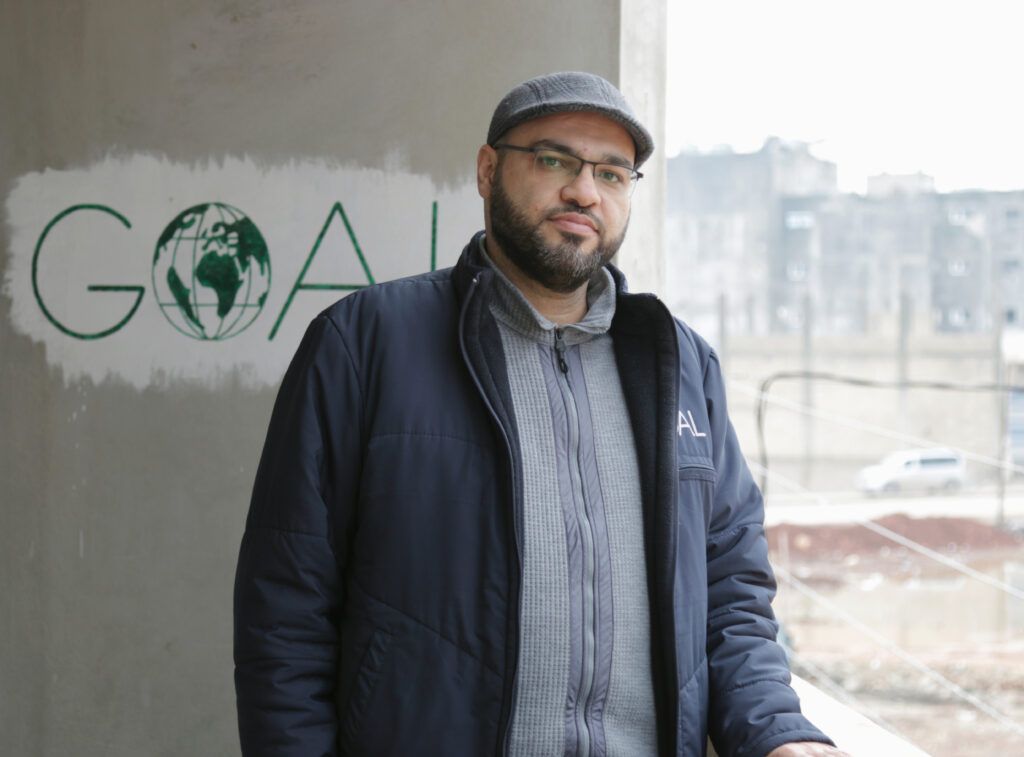
Youssef, GOAL Syria, Programme Quality Coordinator.
Like Mahmoud, Youssef, a GOAL Programme Quality Coordinator, spent his formative years and university days in Aleppo.
“With the emergence of popular activism in Syria in 2011, I joined the peaceful movement in my city, driven by a desire for justice, freedom, and dignity,” explains the 40-year-old man.
After the violent crackdown on protests in Syria, Youssef began participating in volunteer work as a teacher to support children affected by conflict, as well as helping to deliver aid to his city’s vulnerable communities. Yet as Aleppo’s neighbourhoods became divided, with conflict lines separating areas controlled by the Assad regime and the opposition forces, continuing aid work meant putting one’s life at risk.
“I escaped certain death more than once under the ceaseless shelling on Aleppo in the early years of the conflict. Despite the dangers, I continued to work for the sake of my city and its good people, who held on to their homes and land,” Youssef says.
However, by 2016, staying in Aleppo had become impossible for Youssef. He and his family were displaced to Idleb, where Youssef began working for GOAL. It was during this period, while in displacement that Youssef lost his father.
“He had always refused to leave our house in Aleppo, saying, ‘I will not leave this house except to my grave.’ But the war forced us all to flee, and my father died a stranger, far from the city that he loved until his last breath,” continues Youssef.
After the end of the conflict, Yousef soon found that his worries about Aleppo’s current state were not unfounded. As he set foot in the Old City, Aleppo’s historic centre, he found himself surrounded by devastation. The civilian infrastructure and the eastern neighbourhoods lay in ruins, and people were impoverished.
“When I stood in Saadallah Al-Jabri Square at the centre of the town and the citadel, I could not hold back my tears. These two historical landmarks of Aleppo carry unforgettable memories from my childhood and youth. I felt as though I was crying for my city and for every beautiful moment that was lost in it,” Youssef shares.
Yet Youssef remains hopeful that Aleppo can be rebuilt.
“Despite all this pain, there were other feelings welling up inside me, feelings of hope,” he says.
“Aleppo, despite all the destruction and suffering it has been through, is still standing tall with its people and history as one of the oldest inhabited cities in the world. I’m certain that we will return to it and that it will be even better than it once was after rehabilitation work starts. Because Aleppo is a symbol of determination and dignity and a living witness to its people’s will to go on.”
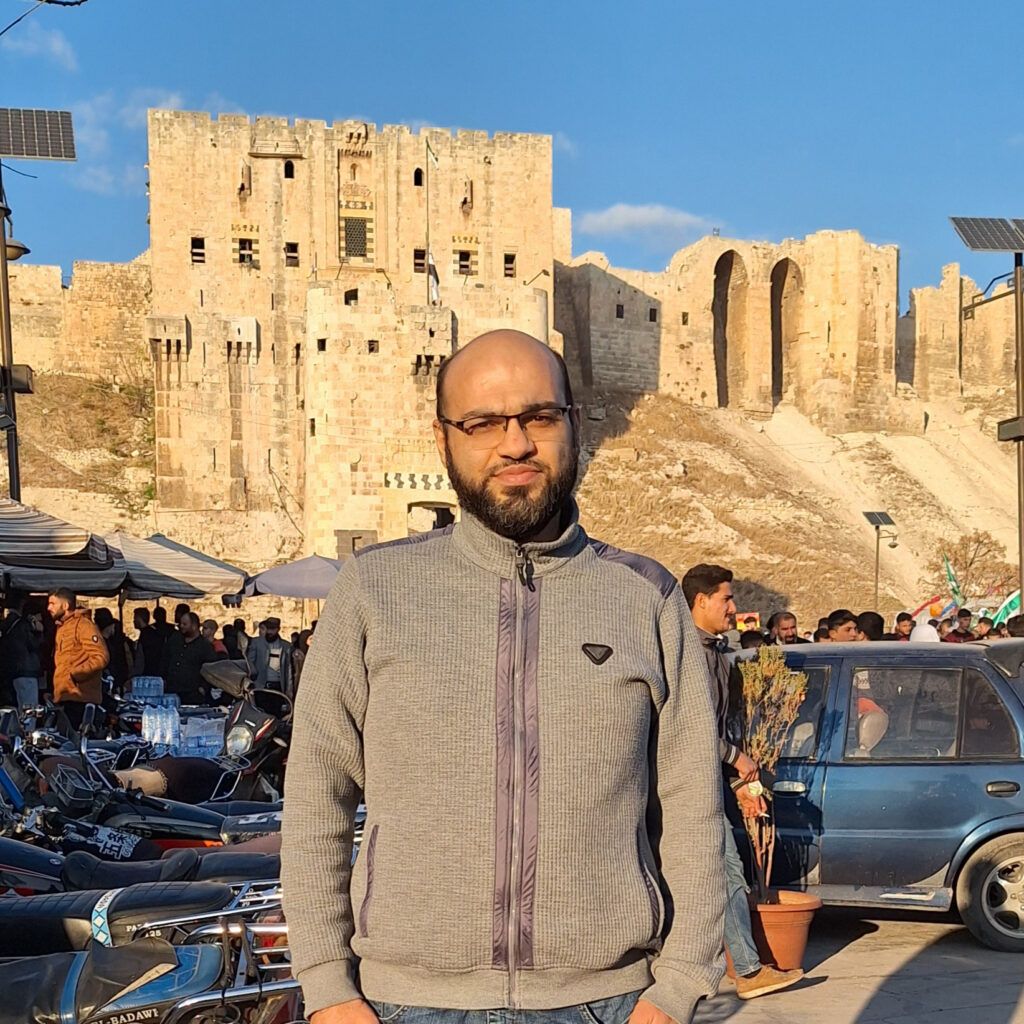
Youssef in Aleppo City after the fall of Assad.
Idleb’s Destroyed Villages: Buthaina, Zaki, and Nazih’s Stories
Buthaina, Zaki, and Nazih all grew up in Idleb’s countryside and led calm, stable lives until conflict engulfed their country. As their villages were far from the front lines, they weren’t immediately impacted. Yet by 2019, as forces affiliated with the former government of Syria advanced towards Idleb, they had all joined the ranks of Syria’s internally displaced.
Buthaina, a member of the GOAL Beneficiary Selection Team, is a mother of five.
“With the beginning of the bombing of Idleb in 2018, our village was subjected to widespread destruction. A long journey of displacement began that saw us travel across Northwest Syria from place to place, village to camp to city as I looked for an opportunity to provide for my children,” she shares.
“In addition to the material challenges of living in displacement, with no end in sight to our troubles, we also suffered a great emotional toll in this period. I knew my family was very lucky to survive the bombs, but the deep sadness of leaving our home and my constant fear for my children’s future weighed heavily,” continues Buthaina.
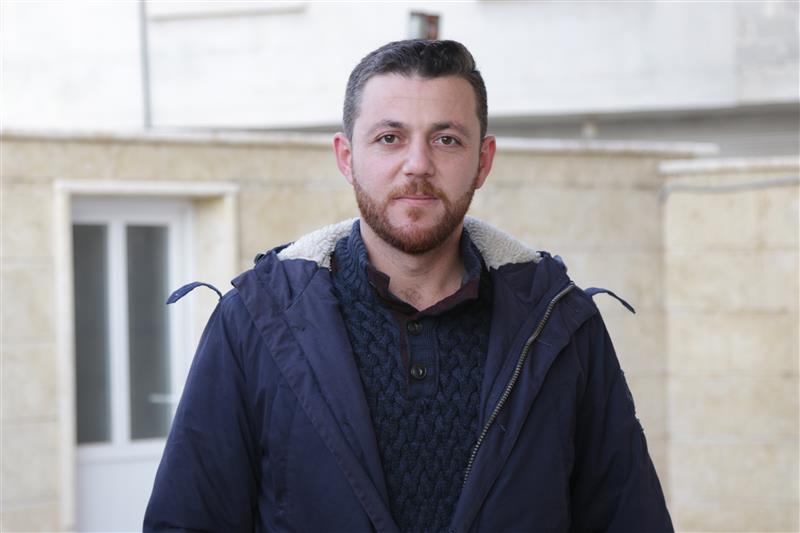
Nazih, GOAL Syria Deputy Nutrition Programme Manager.
Zaki, an Investigation Manager with GOAL and Nazih, Deputy Nutrition Programme Manager, bore the brunt of the worst days of the attack on southern Idleb in 2019. They both resisted leaving their homes for as long as they could, but ultimately, they were left with no choice as the conflict closed in on them.
Nazih had lost faith in the idea of returning to his village but held out hope for future generations.
“We found consolation in the hope that our children might settle there at one point,” says the 33-year-old man.
“Every time we moved house, it rubbed salt into the wound to be reminded that we could not go back home. We had to seek solace by looking at pictures of our village,” he adds.
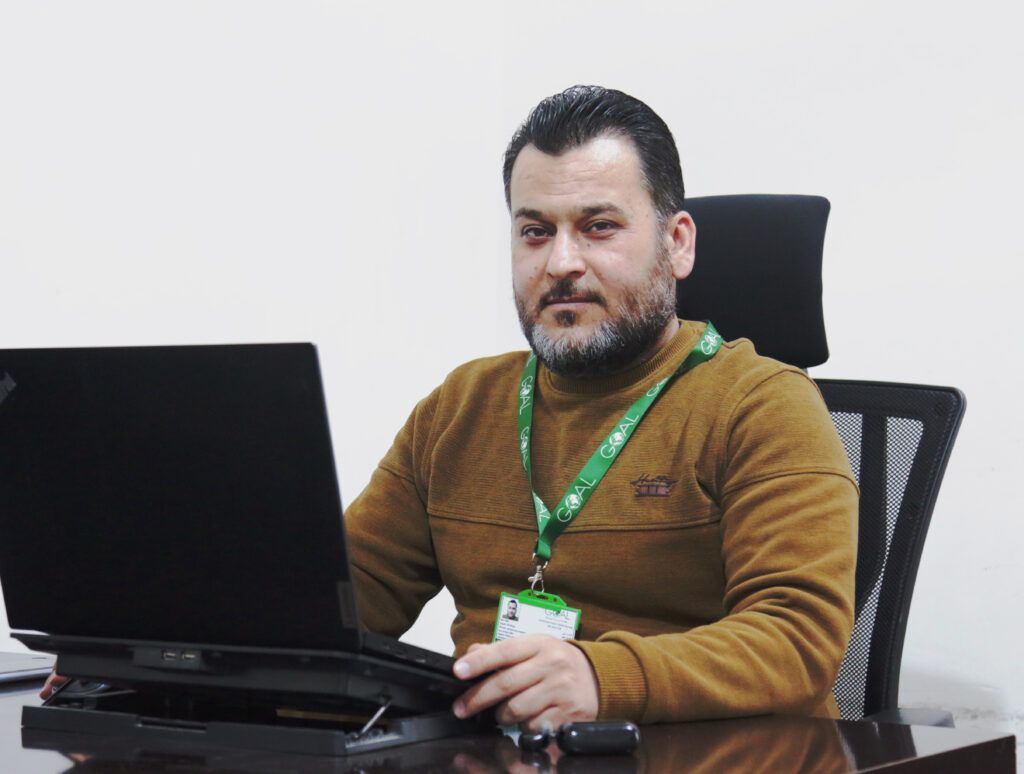
Zaki, GOAL Syria Investigation Manager.
Zaki, however, was bereft of even the smallest of comforts.
“I was very excited to see my village after the fall of the regime, as I had not seen it even in pictures after we had left,” he explains.
While in displacement, the 42-year-old father had to place his family with relatives in a town in Idleb’s countryside while he worked to make a living in the city.
He shares: “I was saddened that my children had no memories of our home as they were so young when we left. Yet the biggest sadness was when, upon visiting my village recently, I found the place deserted, turned to all but a pile of rubble, houses dilapidated and trees fallen. It was a shock to see that our house was neither habitable nor repairable.”
“Everything in everyone’s homes was taken, it seems – even the walls and ceilings were axed away to salvage the iron within the concrete.”
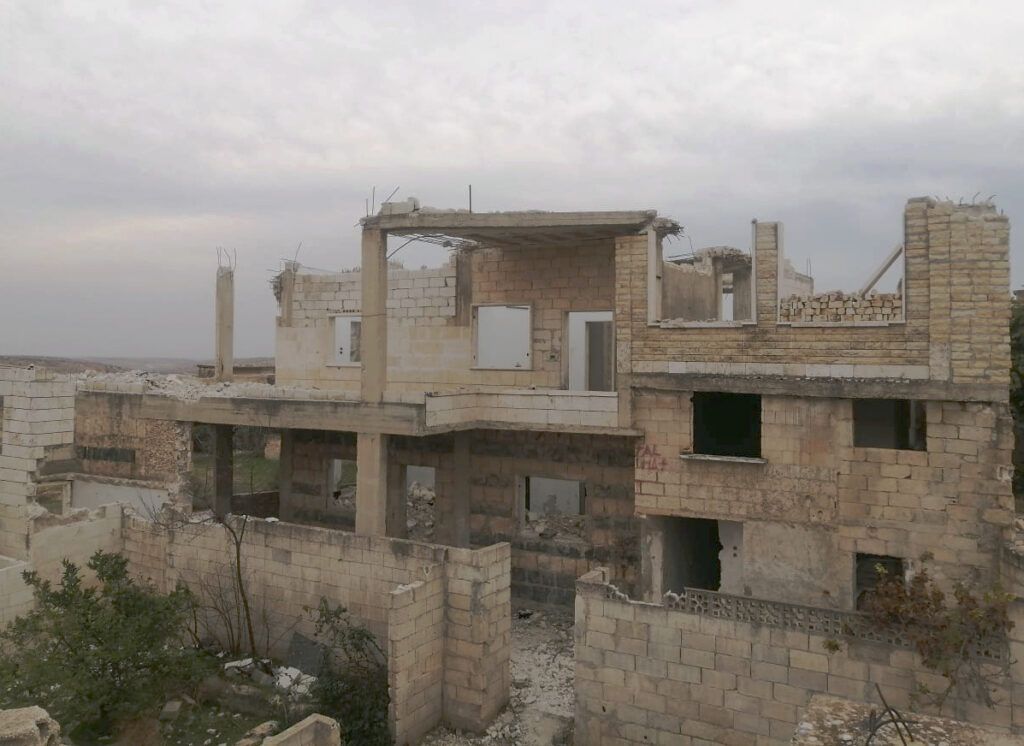
Zaki’s destroyed home in Aleppo.
When Nazih visited his home village, he was met with an equally shocking scene of destruction.
“All our memories are now under the rubble, among the stones destroyed. We could not rejoice in returning as we should have.
“This visit was very painful for my mother… after enduring so much difficulty over the past years, to see what happened to her home, which was the fruit of her toils of over fifty years,” he shares.
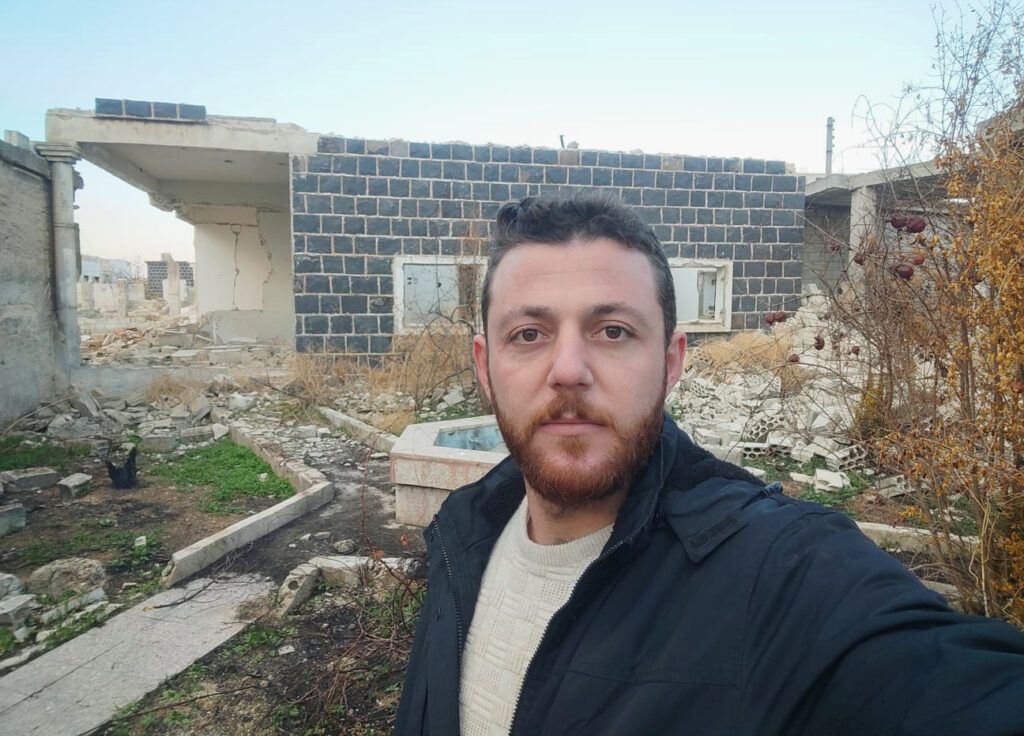
Nazih visits his destroyed home in Aleppo.
Returning Home, a Distant Prospect
When she visited her village, Buthaina witnessed a few returning families who, despite the challenging conditions, were making attempts to restore their damaged homes. However, amongst all the hope and resilience, Buthaina, a seasoned humanitarian with over five years of experience working with displaced populations, understands that significant challenges lie ahead for people hoping to return to their homes and rebuild their lives.
She explains, “The absence of basic services makes the full return of the displaced a major challenge.”
“The joy of returning to our land was indescribable. However, the extent of destruction was also shocking to witness. Not only homes were destroyed – but schools, water and power stations, and the entire infrastructure.”
“More than the loss of our homes, the loss of the people – relatives, neighbours, friends – that we wished to be with us at the moment of liberation also weighs heavily on our hearts,” adds Buthania.
“We cannot return without international support to rebuild. We hope to leave a stable and bright future for the children of our village, and we will work to create a better reality in cooperation with the people of the region and humanitarian organisations,” she concludes.
GOAL has been a leading humanitarian actor in Northwest Syria since 2012, providing critical support to conflict-affected communities. With its ongoing presence in the region, GOAL emphasises the urgent need for immediate and sustained humanitarian assistance and development aid from the international community. Such efforts are crucial in helping the Syrian people rebuild their lives and lay the foundation for a stable and resilient future.
